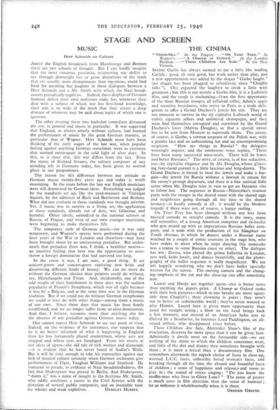STAGE AND SCREEN
MUSIC
Herr Schmidt on Culture ABOUT the English broadcasts from Hamboorge and Bremen there are two schools of thought. But I can hardly imagine that the most timorous pessimist, mistrusting our ability to see through downright lies or gross distortions of the truth that are usually more disingenuous than ingenious, could find food for anything but laughter in those dialogues between a Herr Schmidt and a Mr. Smith with which the Nazi broad- casters periodically regale us. Indeed, these displays of German humour defeat their own malicious ends, for, whenever they deal with a subject of which one has first-hand knowledge, their aim is so wide of the mark that they create a deep distrust of whatever may be said about topics of which one is ignorant.
The other evening these two backchat comedians discussed the arts in general and music in particular. It was suggested that England, as always utterly without culture, had banned the performance of music by the great German masters, in particular that of Wagner. Herr Schmidt must have been thinking of the early stages of the last war, when popular feeling against anything German sometimes went to extremes that seemed extravagant in the cold light of after days. In this, as is most else, this war differs from the last. Even the music of Richard Strauss, the solitary composer of any standing left in Germany today, has been given its normal place in our programmes.
The reason for this difference between our attitude to German music twenty-five years ago and today is worth examining. In the years before the last war English musicians were still dominated by German ideas. Everything was judged by the standards set up, like the yard-measure in Trafalgar Square, by the admirers of Bach and Beethoven and Brahms.
What did not conform to those standards was thought inferior. Yet, if music was to survive as a living art, the application of those standards, already out of date, was fallacious and harmful. Other ideals, embodied in the national schools of Russia, of Prague, and even of our own younger musicians, were beginning to make themselves felt.
The temporary exile of German music—for it was only temporary, and Wagner's operas were performed during the later years of the War in London and elsewhere—may have been brought about by an unreasoning prejudice. But under- neath that prejudice there was, I think, a healthier motive— an intuitive feeling that here was the opportunity to over- throw a foreign domination that had survived too long.
In the event it was, I am sure, a good thing. It set concert-givers and concert-goers exploring new fields and discovering different kinds of beauty. We can no more do without the German classics than painters could do without, say, Michelangelo and Titian. And, incidentally, one of the odd results of their banishment in those days was the sudden popularity of Franck's Symphony, which was all right because it was by a Belgian, and at the same time was in the German tradition. But if we could not do without German symphonies we could at least do with other things—among them a music of our own. Since those days that music has been firmly established, and we no longer suffer from an alien domination. And that, I believe, accounts more than anything else for the absence of any prejudice against German music today.
One cannot expect Herr Schmidt to see our point of view. Indeed, on the evidence of his utterances, one suspects that he is no better informed of what is happening in England than his less fortunately placed countrymen, whose ears are stopped and whose eyes are bandaged. From his sneers at our ideas of opera—the old tale of rich women and diamonds —it is evident that he has never heard of Sadler's Wells. But it will be time enough to take his reproaches against our lack of musical culture seriously when German orchestras give performances of Elgar, Vaughan Williams and Stanford. He ventured to parade, as evidence of Nazi broadmindedness, the fact that Shakespeare was played in Berlin. And Shakespeare, " damn it," was a name of nought to the fictitious Mr. Smith, who oddly combines a career in the Civil Service with the direction of several public companies, and an insatiable taste
for whisky and weak expletives. DYNELEY HUSSEY.






































 Previous page
Previous page